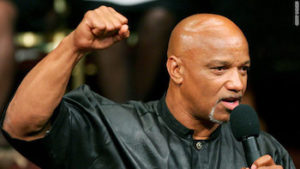
Elmer Geronimo Pratt
*Geronimo Pratt was born on this date in 1947. He was a Black activist.
Elmer Pratt was born in Morgan City, Louisiana, where his father was in the scrap metal business. Pratt was a football quarterback at Sumpter Williams High School who later served two combat tours as a soldier in the Vietnam War, reaching the rank of sergeant and earning two Bronze Stars, a Silver Star, and two Purple Hearts. He later moved to Los Angeles and became known as Geronimo ji-Jaga and Geronimo ji-Jaga Pratt. He also was the godfather of Tupac Shakur.
Pratt studied political science at UCLA; Bunchy Carter and John Huggins recruited Pratt into the Black Panther Party. When Pratt joined, his years in the army proved useful. He rose to be Minister of Defense of the Los Angeles Chapter after two of its officers were killed. In 1971, Pratt's wife Saundra was killed while eight months pregnant and left in a ditch. The murder was blamed on a Party schism between supporters of Huey Newton and those of Eldridge Cleaver, with Geronimo Ji Jaga and his wife belonging to the Cleaver faction. Geronimo later understood this to be an F.B.I. lie. Saundra's murder was unrelated to the Black Panther Party.
By January 1970, the Los Angeles FBI office had sought permission from headquarters for a counterintelligence effort "designed to challenge the legitimacy of the authority exercised" by Pratt in the L.A. Panthers. Another FBI memo dated five months later noted that the Bureau was constantly considering counterintelligence measures designed to neutralize Pratt "as an effective (Panther) functionary. In 1968, Caroline Olsen, a 27-year-old elementary school teacher, was murdered by gunshot during a robbery on a Santa Monica tennis court. Olsen's husband, Kenneth, who was also shot but survived, identified Pratt as the killer.
Julius Butler, a Black Panther and police informant, testified that Pratt had confessed to him and discussed the murder with him several times. 1970, Geronimo Ji Jaga was arrested and charged with murder and kidnapping. He argued that the charges should be dropped, alleging that Geronimo Ji Jaga had been 350 miles away on the night of the murder. He was convicted in 1972. Journalist and author Jack Olsen reported that FBI "moles" had infiltrated defense sessions and monitored Cochran’s phone calls. During Pratt's incarceration, he studied law and built his defense.
Attorneys Stuart Hanlon and Johnnie Cochran represented him in his original trial. With William Paparian, Hanlon worked on the appeals that later led to Pratt's conviction being vacated on June 10, 1997, because the prosecution had concealed evidence that might have influenced the jury's verdict. The prosecution had not disclosed the extent to which a key witness against Pratt, Julius Butler, provided information to the FBI and the Los Angeles Police Department. An appeals court ruled this fact to be "'favorable' to the defendant, 'suppressed' by a law enforcement agency, and 'material' to the jury's decision to convict" in 1999 and upheld the decision, freeing him. On July 24, 1997, after being released from prison, Pratt rushed back to his hometown to see his aged mother, Eunice, whom he had not seen in 23 years since she rode a bus to visit him at Folsom Prison.
Geronimo Ji Jaga eventually received $4.5 million as a settlement for false imprisonment. A federal judge approved the civil suit settlement: the city of L.A. paid $2.75 million of the settlement, with the U.S. Department of Justice paying the $1.75 million remainder. Geronimo Ji Jaga continued to work for men and women believed to be wrongfully incarcerated until his death, including participation in rallies in support of Mumia Abu-Jamal, whom he had met when both were active as Black Panthers. Geronimo Ji Jaga was living in Tanzania at the time of his death. He died of a heart attack in his adopted country on June 3, 2011.